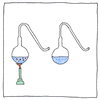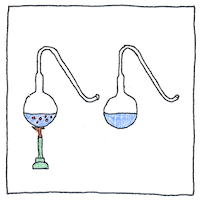Louis Pasteur
bacteriology

|
Germ theory
At the time, people thought that maggots and microbes were caused by miasmas, poisons floating in the air. In a sequence of amazing experiments, Louis Pasteur, French chemist, demonstrated that living microbes caused fermentation, putrefaction, and infection, thereby establishing new ways of thinking about bad smells.
Pasteurization
Pasteur saved the French silk worm by finding the parasite that infected it, improved French wine by teaching vintners how to prevent souring with heat treatments, and showed that vaccinations were effective against anthrax in French sheep and against rabies in French people. Today, in America, we want our milk sterilized and our wine au naturel. Of course, some people want their milk raw and their wine cooked. Maybe we can understand a lack of appreciation for the subtleties of aging wine, but not an ignorance of the effects of germs. How can anyone so lack suspicion of things that cling to the udders of cows? Today the French silk industry has succumbed from other causes, but vaccinations of humans, pets, and other animals are much in demand for a variety of diseases— chickenpox, cholera, diphtheria, hepatitis A and B, influenza measles, meningitis, mumps, papillomavirus, pertusis, polio, rabies, rubella, smallpox, tetanus, tuberculosis, typhoid, varicella, and yellow fever. If a body were never exposed, it wouldn’t develop defenses against the conditions that we encounter in everyday existence. Birds defecate in trees; animals urinate on ivy; bugs crawl over dirt and onto lettuce; flies breed in dung before walking on the back of your neck. More bacteria can thrive on the toe of a cockroach than angels who dance on the head of a pin. It is no great wonder if we do not dare to eat a peach or remove our shoes to walk in the sand. Our culture in American is overly protective, but we cannot calm incapacitating fears of bugs, grubs, worms, and spiders with our antiseptic mouthwashes, disinfectant lotions, antibacterial sprays, germicidal soaps, surgical masks in subways, chloramine in tap water, insecticides, and fungicides. No wonder that some parents fear that subjecting their children to a barrage of innoculations would not be innocuous.
Cayenne
In Somalia, teaching hygene to tribal children, the health worker needs to convince them that things they cannot see can yet harm them, so the trick is to put a little cayenne in a small bowl, have them rub a finger in it and wipe it off until it is all gone, then ask if they would touch the finger to an eye— No, no, no, no!



According to the United Nations, improving sanitation reduces cholera, worms, diarrhoea, pneumonia, malnutrition, and other maladies that cause disease and the death of millions of people. In 2008, a child died every 20 seconds because of poor sanitation. Improving sanitation for a people improves their economy, their dignity and social development, and their environment.
The developed world has overused antimicrobial agents, breeding drug-resistant microbes to the point where it is barely able to sterilize hospital operating rooms. And we have no cure for herpes or dengue fever.
Microorganisms (bacteria, fungi including yeast, algae, protozoa, rotifers planarians, and virus) are not all bad; they also ferment our beer and wine and give our cheese and yogurt their distinctive tastes and textures. The Rhizobium bacteria convert nitrogen to a form that can be used by plants. The Penicillium fungi gave us our first anibiotic to combat harmful microbes.
See also in The book of science:
Readings in wikipedia:
Other readings: